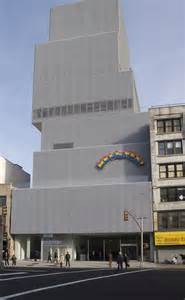Sep 26 2018 - Feb 3 2019
New York City, NY
With wry humor and incisive critique, Vargas parodies mainstream social and institutional codes to reimagine queer and trans experience and representation. Vargas is the founder of the Museum of Transgender Hirstory & Art (MOTHA), a semi-fictional institution that serves as a malleable platform for exhibiting transgender art and hirstory. Taking up the contested legacy of the word “history,” Vargas notes that “for millennia, the patriarchy has had versions of history; for a few years in the 1970s, some white feminists had herstory; but it hasn’t been until now that transgender people have finally had a gender-neutral hirstory all their own.”
At the New Museum, Vargas will continue work on his project Transgender Hirstory in 99 Objects (2015–ongoing), a visual and material exploration of significant artifacts in the history of transgender communities. Major museums often present one hundred objects from their collections to construct “definitive” historical narratives; in this series, Vargas riffs on this convention, purposefully presenting only ninety-nine objects to point to the forever incomplete project of representing history. A creative and critical exploration of LGBTQI archives, Vargas’s ongoing project takes the form of exhibitions (of which this will be the fifth), publications, and touring performances in which the artist appears as the Executive Director of MOTHA.
This iteration of the project will explore Stonewall as a geographically, demographically, and historically contested site. Throughout MOTHA’s four-month exhibition, Vargas will question what we know about the 1969 Stonewall riots in New York, often cited as a formative event for gay liberation as well as the modern LGBTQI civil rights movement in the United States. For years, many of the activists who led the fight against violence and police brutality against queer and trans people—including Sylvia Rivera, Marsha P. Johnson, Miss Major, and many others—were not properly recognized in popular accounts of Stonewall. Today, these figures are increasingly acknowledged in mainstream LGBTQI histories, yet narratives of their work often elide their more radical demands and critiques of racism, economic marginalization, and transphobia.
Credit: Exhibition overview from museum website
Exhibition Venues & Dates
Sep 26 2018 - Feb 3 2019
New York City, NY
